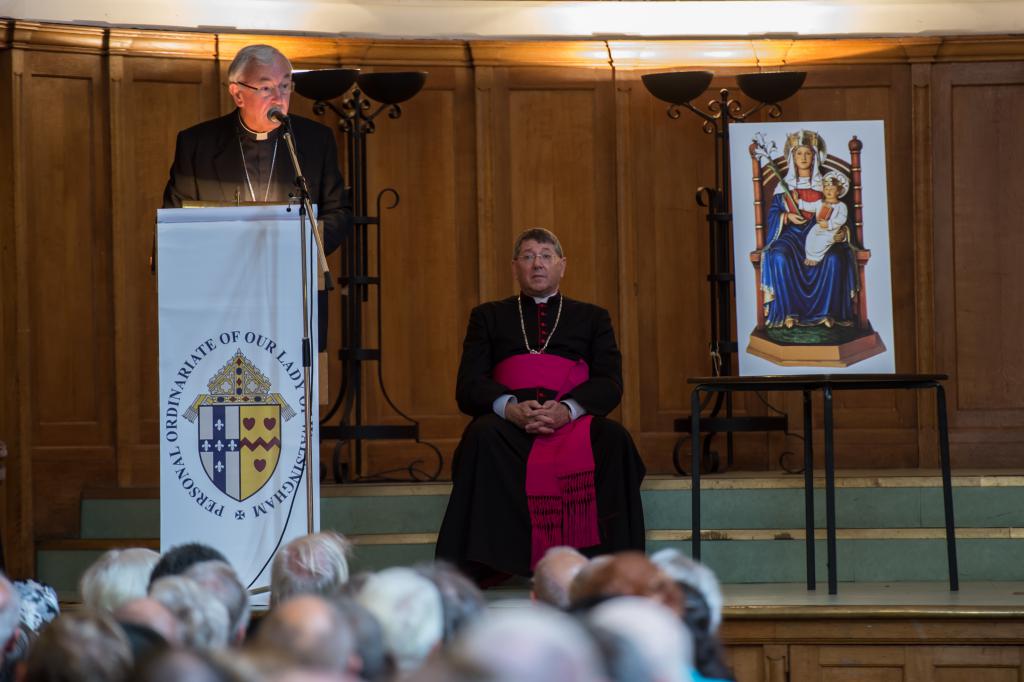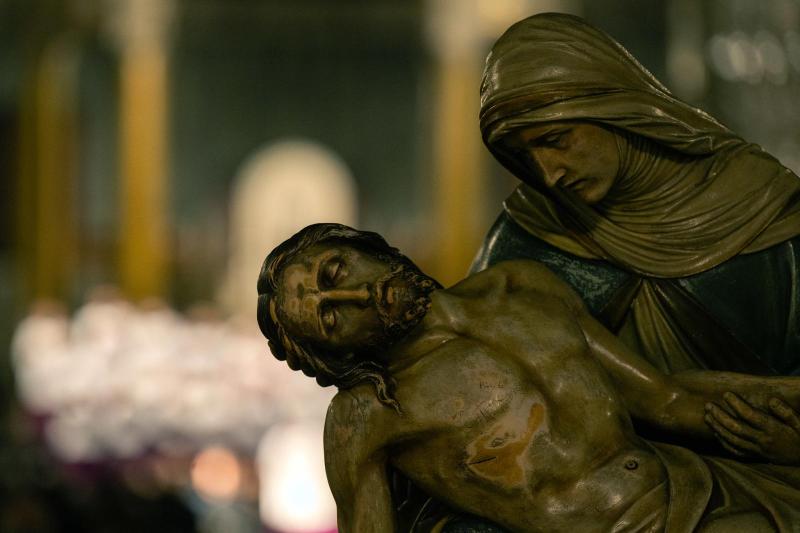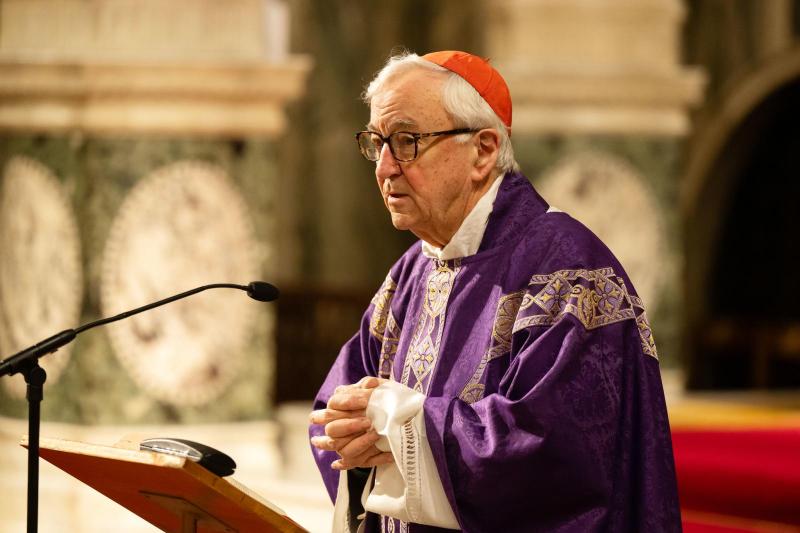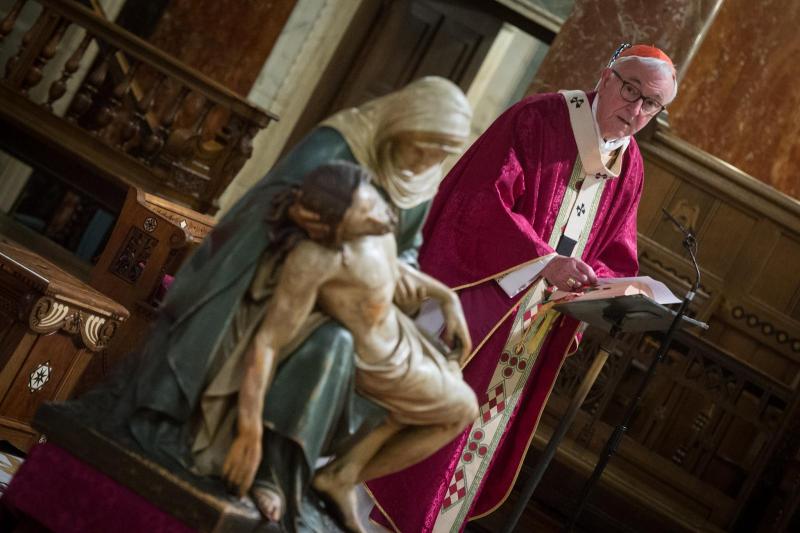On 20 September, Cardinal Vincent Nichols gave the following address to at the first Ordinariate Festival, which took place in Westminster Cathedral Hall, followed by Mass in the Cathedral.
On 4 November 2009, Pope Benedict issued his Apostolic Constitution 'Anglicanorum Coetibus' by which the erection of this Ordinariate of Our Lady of Walsingham, and of others around the world, was made possible. Here again are its opening words. It is good to remember them.
'In recent times the Holy Spirit has moved groups of Anglicans to petition repeatedly and insistently to be received into full Catholic communion individually as well as corporately. The Apostolic See has responded favourably to such petitions. Indeed, the successor of Peter, mandated by the Lord Jesus to guarantee the unity of the episcopate and to preside over and safeguard the universal communion of all the Churches,[1] could not fail to make available the means necessary to bring this holy desire to realisation.'
What does this make clear? That this initiative of Pope Benedict is a response to a holy desire - your holy desire - both as groups and as individuals; that its purpose is to open a new way for the unity of the Catholic Church, visible under the successor of Peter, to be enlarged. It is a generous initiative and one which has always expected a generous response.
Lying within this 'holy desire' which Pope Benedict so obviously shared, were certain convictions which came to be recognised and made explicit in this initiative of the Holy See. They were an appreciation that aspects of the way of life of the Anglican Communion were truly consonant with Catholic Faith; that a new pathway into full communion could serve a wider reconciliation among Christians; that there was legitimate 'space' within the Catholic Church for a greater plurality of expression both of the one faith and of the way of life it forms. The opening paragraphs of the Apostolic Constitution also remind us of the basis for such hopes. It states:
'This single Church of Christ, which we profess in the Creed as one, holy, catholic and apostolic “subsists in the Catholic Church, which is governed by the successor of Peter and by the Bishops in communion with him. Nevertheless, many elements of sanctification and of truth are found outside her visible confines. Since these are gifts properly belonging to the Church of Christ, they are forces impelling towards Catholic unity”[11].'
'Anglicanorum Coetibus' seeks not only to offer a new invitation to those seeking the full communion of the Catholic Church, but it also seeks to enrich the Church with 'elements of sanctification and truth' to be found within what is called 'Anglican patrimony'. 'Anglicanorum Coetibus' seeks to release that 'force' by which Catholic unity can be more fully and visibly expressed, its beauty made more evident and its appeal more widely appreciated. Here it is so important to note that mission and communion are inextricably bound together.
It is never easy to do something new in total fidelity to something familiar to so many. The tension is clear: for some the newness appears to be outside the familiar, not truly belonging to what they already know and love; for others it is important to move beyond the familiar precisely so as to demonstrate newness. So the questions still arise in the minds of many: on the one hand, some will ask if members of the Ordinariate are really Catholics? On the other, those who have joined the Ordinariate will ask if they are being truly distinctive enough or whether absorption into diocesan parishes and structures will be the inevitable end? This is not an easy path.
The Apostolic Constitution offered principles and guidance for the fashioning of this path. On the one hand, it established the Ordinariates with direct lines of accountability to the Holy See. The power, 'potestas', of the Ordinary is exercised in the name of the Holy Father. In this the Ordinariate is not the same as a diocese. On the other hand, an Ordinariate is only established in consultation with the Bishops' Conference of the territory concerned and its jurisdiction is exercised in a 'cumulative' manner, that is 'together with that of the local Diocesan Bishop' (V). This is a new concept to all of us. An example of it is that the priests of the Ordinariate are properly incardinated into the Ordinariate. However, they are not to stay apart but cultivate bonds of unity with the priests of the Diocese, promoting common pastoral and charitable initiatives and activities (VI.4).
In these and other ways, the founding documents seek to outline that path of distinctiveness within the unmistakable, visible and familiar unity of the Catholic Church.
The Ordinariate really took off in this country, under the patronage of Our Lady of Walsingham and the Blessed John Henry Newman, with the ordination of Keith Newton, John Broadhurst and Andrew Burnham on 15th January 2011. As I said on that occasion:
'Many ordinations have taken place in this Cathedral during the 100 years of its history. But none quite like this. Today is a unique occasion marking a new step in the life and history of the Catholic Church. This morning the establishment of the first Personal Ordinariate under the provision of the Apostolic Constitution “Anglicanorum Coetibus” has been announced in our hearing. So I too salute John Broadhurst, Andrew Burnham and Keith Newton who are to be the first priests of the Ordinariate of Our Lady of Walsingham. In particular I offer my prayers and best wishes to Keith, chosen by the Holy Father to be its first Ordinary. This is indeed an historic moment.'
Much has happened since then, with the establishment of places and customs distinct to the Ordinariate and a wide range of activities and responsibilities which are shared with the dioceses. The balance between distinctiveness and familiarity within the unity of the Church is still evolving.
The Blessed John Henry Newman, given to the Ordinariate as a heavenly patron, has much to teach us. Pope Benedict spoke of him, in December 2010, in these words:
'The path of Newman's conversions is a path of conscience – not a path of self-asserting subjectivity but, on the contrary, a path of obedience to the truth that was gradually opening up to him. His third conversion, to Catholicism, required him to give up almost everything that was dear and precious to him: possessions, profession, academic rank, family ties and many friends. The sacrifice demanded of him by obedience to the truth, by his conscience, went further still. Newman had always been aware of having a mission for England. But in the Catholic theology of his time, his voice could hardly make itself heard.... In January 1863 he wrote in his diary these distressing words: “As a Protestant, I felt my religion dreary, but not my life - but, as a Catholic, my life dreary, not my religion”. He had not yet arrived at the hour when he would be an influential figure. In the humility and darkness of obedience, he had to wait until his message was taken up and understood.'
Then Pope Benedict continued: 'In support of the claim that Newman's concept of conscience matched the modern subjective understanding, people often quote a letter in which he said – should he have to propose a toast – that he would drink first to conscience and then to the Pope. But in this statement, “conscience” does not signify the ultimately binding quality of subjective intuition. It is an expression of the accessibility and the binding force of truth: on this its primacy is based. The second toast can be dedicated to the Pope because it is his task to demand obedience to the truth.' (December 20, 2010)
There are two lessons we are to take from this.
The first is the lesson of patience and humility. There is waiting to be done. We, you, are to be faithful to the opportunity, the gift, you have been given and steadfast in your trust that it is of the Church, of the Holy Spirit. We, you, must be patient and not obstruct that work with excessive anxiety of heart or with a spirit of contestation.
The second point is clear, too. What is done within the Ordinariate, if done in the spirit of this Patron, will not be done as a matter of personal taste, of subjective likes and dislikes. Whether in matters of liturgy or music, in ecclesiastical patterns or priorities, what matters is that we, you, are striving not to satisfy your own taste, your own personal preferences, but to give a glimpse of a truth, a saving truth, which lies at the root of our relationship with God.
This, I believe, is your challenge: to make evident aspects of the truth and beauty contained in Catholic teaching and life in a way that may have a particular appeal to sensitivities fashioned by the Anglican tradition and influence. This, perhaps, is at the heart of the specific gift you bring to our Church and to our common task of evangelisation.
Now for me to say that the fashioning of this Ordinariate contribution is not a matter of personal taste but of showing forth a real and objective truth is not as simple as it sounds. But may I also suggest a criterion by which that discernment between subjective taste and service of the truth may be made? It is contained in the Apostolic Constitution with which I started out. It spoke about 'many elements of sanctification' which are to be found outside the visible Catholic Church. This is the criterion. Does what you do, in pursuit of a proper distinctiveness, clearly lead to holiness? Is it in the service of sanctification? This is what counts.
Now clearly there is much evidence in life and history of the Church of England to testify powerfully that the answer is 'yes'. This is very reassuring. Holiness has been the fruit of so much of what you bring for many generations. But that still leaves the question of our intent. In fashioning the patterns of the Ordinariate, be they liturgical or pastoral or evangelical, the intent must not be that of preserving a tradition or pattern that is familiar and comforting. It must be that of fostering and nurturing holiness. Yes, it is true, that often what appeals to me helps me to grow closer to the Lord. But it is also true, and often the experience of many within the Church, that I am fashioned more deeply in my love and service of Him by what I do not particularly like but is nevertheless expected of me.
We live in an age of deep individualism. The priority of personal satisfaction is in the air we breathe. This is not a healthy culture for those who truly wish to follow Christ, who seek to put His will first and who are willing literally to forego their own preferences for love of him and his Church.
So I hope that as the Ordinariate develops, its parishes and groups will not be shaped by the individual personal preferences of its members, by personal likes and dislikes which are often so contentious. I pray instead that it will be shaped by a rigorous search for that which serves to draw people today closer to the Lord in prayer, in liturgy and in service.
This closeness to the Lord is, of course, the essential seed bed of the work of evangelisation to which we are all called. The readiness to spread the Gospel to which we are all called springs from a personal readiness to hear the Gospel and to be converted by it, day after day. By chance I came across a wonderful expression of this truth in some words of Blessed John Henry Newman. He wrote: 'Let us but raise the level of religion in our hearts and it will rise in the world. He who attempts to set up God's Kingdom in his heart furthers it in the world. He whose prayers come up for a memorial before God, opens the windows of heaven, and the foundations of the great deep, and the waters rise.'
The work of evangelisation begins in the heart. Its foundations are in our spiritual life. Its fruitfulness flows from our devotion. Its perseverance comes from our faithfulness to prayer. Its energy arises in the work of our sanctification, the work of the Holy Spirit himself, the journey of our spirit deeper into the heart of God himself.
These thoughts flow, of course, from Pope Francis' insistence on the importance of popular devotion, on religious practices which have long been embedded in a culture and a people. The development of your understanding of this insistence could, I suggest, be a fruitful road for the Ordinariate to travel.
I would like to make one final point.
Our reflection on Evangelisation comes more and more to emphasise the importance of the constant announcing of the 'kerygma', the first and crucial kernel of truth that changes everything. As Pope Francis insists, this is first not in the sense than it is to be completed first and then we move on to more important or complex matters. Rather it is first in the sense of always to be presented, always to be repeated, always to be our first intent, whatever we may be doing, whether in liturgy, catechesis, preaching or the outreach of caritas. Always our first intent is to make clear this basic message of God's love and mercy for everyone, made visible in the person of Jesus who died that we might live. What we are learning is that no other preoccupation, whether aesthetical or ethical, should obscure this first and life-giving truth. This is a testing criterion we should apply to all that we do. It is to understand evangelisation as, in Pope Francis' words, a paradigm rather than a programme.
In our society today, perhaps there is a further emphasis to be given. The questions many people have today are not so much about Jesus as about God. What we meet is ignorance about God, a culture in which there truly is, in Pope Benedict's words, an 'eclipse of God'. So what we have to do, again through our service of those in need, through our liturgy, through our life in common, is to offer a glimpse of life lived in a relationship with God and of how, without any sense of God, we quickly become, at a profound level, strangers to ourselves, and just as quickly, strangers to each other.
Thank you for this opportunity to reflect with you on the story so far of the Ordinariate of Our Lady of Walsingham and on some of the priorities which I believe can help you to address and fulfil the role to which you have been called. I hope these few remarks are helpful and I gladly assure you of my prayers for all that lies ahead.
+Vincent Nichols



